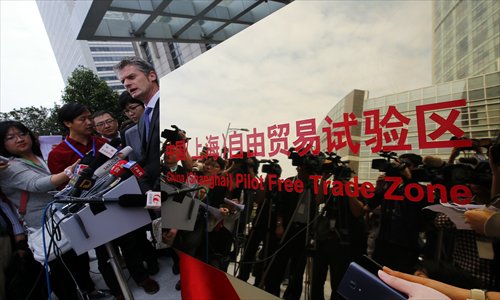Lessons from the Shanghai FTZ
- By John Ross
 0 Comment(s)
0 Comment(s) Print
Print E-mail China.org.cn, July 12, 2014
E-mail China.org.cn, July 12, 2014
|
Ralph Haupter, corporate vice president of Microsoft, talks with reporters during a press conference after the inauguration of the China (Shanghai) Pilot Free Trade Zone during a ceremony in Pudong district of Shanghai on Sept. 29, 2013. [Xinhua via agencies] |
Developments since the launch of Shanghai's Free Trade Zone (FTZ) last year illustrate again how parts of the Western media continue to fail to grasp both China's economic policy and the reasons for its success in achieving more than three decades of rapid economic growth. Therefore, both because of the significance of the FTZ, and the lessons to be drawn from it, it is worth analyzing its development.
China famously developed its economic policy, since its "reform and opening up" was launched in 1978, in line with the dictum of "crossing the river while feeling for stones." This is one of the principal reasons for China's success -- in comparison to the deep economic collapse produced by the "shock therapy" pursued in Russia and Eastern Europe in the 1990s. But when in 2013 China announced the Shanghai FTZ, sections of the media assumed China's successful approach was going to be thrown to the winds and radical and untested policies, such as RMB capital account convertibility, were to be adopted. Instead of its proven successful approach, China would at last adopt the type of approach favored by its critics -- which had a track record of proven disaster wherever it had been attempted!
Instead, on a recent visit to the Shanghai FTZ, President Xi Jinping clearly specified how the zone was to proceed. Management of the Shanghai FTZ: "should combine structural reform and the exploration of new methods, while controlling risks and gradually making improvements." In short, "crossing the river while feeling the stones" would continue.
Such an approach led the Wall Street Journal to complain: "Even supporters have been frustrated by the policy inaction, leaving many to wonder how serious authorities are about true reform." "True reform," for the Wall Street Journal, presumably constitutes the type of policies which it supported in Russia and Eastern Europe, and which led to the greatest economic collapse ever seen in major economies in peacetime! Fortunately, China has refused to undertake such "true reform."
Instead, the reality is that since it was established, the FTZ has done the job set out in Xi Jinping's statement. More than 16,000 businesses have registered in it. Calculated innovations have been introduced in the financial and regulatory fields.
A key step in the FTZ is the move to a "negative list" approach to foreign investment -- one where foreign investment can be in any sector except those where it is explicitly prohibited or restricted. This negative list has then itself been progressively reduced -- the number of sectors where foreign investment is prohibited or restricted being reduced from 190 to 129.
Sectors now opened to foreign investors include oil refinery, nonferrous metal smelting and the wholesale market. Within the financial sector foreign investors are now allowed to participate in the banking industry and the services offered by finance, trust and currency brokerage companies. "Cash pooling," in effect the treatment of different RMB accounts as a single one across borders in terms of their overall credit and debit position, is allowed in the FTZ whereas it is prohibited in the rest of China -- giving greater flexibility to companies in financial management.






